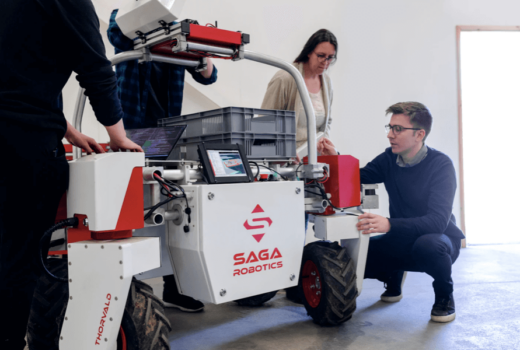Poetin geeft geschiedenisles

De president reisde ervoor naar Jekaterinenburg in de Oeral, waar men in deze stad – waar Yeltsin ooit begon als plaatselijke Sovjet-chef – een soort bibliotheek, museum en eregalerij voor de eerste president van het nieuwe Rusland ging inwijden. Poetin beklaagde zich in zijn openingsrede erover, dat de jeugd onwetend is over de historie en betekenis van Boris Yeltsin en de gebeurtenissen in het recente verleden van hun land.
President en Tsarina
Het nieuwe centrum moest zich er dus vooral op richten de jonge generaties het juiste verhaal en beeld bij te brengen. “We need to know and study this difficult experience with its many aspects and dimensions, take pride in it, learn lessons from it, of course, and feel and understand its spiritual and moral significance,” zo citeert Poetins opmerkelijk informatieve persoonlijke website de tekst van zijn inwijdingstoespraak.
Jekaterinenburg, de stad van Yeltsin, heet naar de grote tsarina Catharina II, inderdaad ‘Katerina-burcht’. Zij liet deze stad met die Duitse naam stichten door gevluchte protestanten die in haar orthodoxe keizerrijk toevlucht zochten en hielpen de Oeral met zijn rijke delfstoffen en andere bodemschatten te ontwikkelen. Zij was zelf een Lutherse prinses uit het vorstendommetje Anhalt-Zerbst in de buurt van Dessau en Maagdenburg en uitgehuwelijkt aan de kroonprins van Rusland. Deze zette zij in 1762 af met behulp van de keizerlijke garde, zodra hij zijn moeder tsarina Elisabeth opvolgde. Haar beleid leek wel op dat van Yeltsin. Zij combineerde grote openheid naar het Westen met een fors binnenlands bewind en een grote gulzigheid naar de goede dingen des levens.
Het betoog van Vladimir Poetin over historie, verandering en betekenis van Rusland en zijn eerste president leest u hieronder.
Today, we are opening the Boris Yeltsin Centre. This is more than simply a tribute to Russia’s First President. The centre was conceived as a place that would reflect an entire era in our history, a time of radical change, very important, difficult, and, of course, contradictory transformations.
We saw the exhibition just now. It really does tell the honest story of how modern Russia was built, the difficulties encountered on the way, and the problems that had to be solved. It is the story of all that was accomplished during this difficult period.
We are learning to objectively and carefully treat and respect our history and the centuries-long uninterrupted road our country has travelled. This road was full of great achievements, sharp turns, mistakes, and outstanding victories. We need to know and study this difficult experience with its many aspects and dimensions, take pride in it, learn lessons from it, of course, and feel and understand its spiritual and moral significance.
The centre’s exhibition is an example of how we apply this attitude to what was one of the key stages in Russia’s development. It has collected and systemised a unique and very large quantity of documentary materials.
Boris Yeltsin’s own destiny and personality reflected in full the tremendous challenges, difficulties and contradictions of that time. He had a determined, direct and courageous character and the ability to be resolute to the limit. It was in large part thanks to these qualities of his that our country stayed on the democratic development track it had chosen. It was then, at a time of intense political confrontation, that our country’s Constitution was adopted, forming the foundation and providing the clear provisions for beginning the constructive period of our development.
Boris Yeltsin had a deep understanding of the dramatic nature of the radical transformations taking place. He lived these changes himself in full, in his conscience, soul and heart, knew doubts and torments, and knew what tremendous difficulties our people had to go through. It was then that he took the decision to step down and, as we remember, addressed Russia’s people with sincere words, a genuine confession. In this, we see his strength, honesty and openness.
Mrs Yeltsina, you were at Boris Yeltsin’s side for more than 50 years and you earned the respect of millions here in Russia not just as the First President’s wife, but also as someone of great tact and strength. We feel your warmth and generous spirit here in this hall too. I want to thank all of the Boris Yeltsin Foundation’s organisers and trustees for their active participation in establishing the centre. The Sverdlovsk Region and Yekaterinburg authorities made a big contribution here. I hope the centre will continue to receive your all-round support.
There is a lot of work ahead. The centre must live and develop as an educational platform and venue for carrying out many different projects, including social projects. Of course, young people and their interests will be a particular focus of attention.
It must be said that young people today know little about our recent past and about the life of our country’s First President. It is important that young people become frequent visitors to the centre, take part in its programmes, study our history, and gain deep understanding of its significance for their intellectual and spiritual development.
Friends,
I recall Boris Yeltsin’s words, which the whole country knows now: Look after Russia! Those words were addressed to all of us, to present and future generations. Boris Yeltsin wanted our country to become strong, prosperous and happy. We have already done a lot to achieve these aims. We have overcome many difficulties, and we will without question resolve the tasks ahead.
Russia will grow stronger and develop through our people’s labour, efforts and devotion to their homeland.
Thank you very much for your attention.
Meest Gelezen
Vrouwen houden universiteit draaiende, maar krijgen daarvoor geen waardering
Wederom intimidatie van journalisten door universiteit, nu in Delft
‘Burgerschapsonderwijs moet ook verplicht worden in hbo en wo’
Raad van State: laat taaltoets nog niet gelden voor hbo-opleidingen
Hbo-docent wil wel rolmodel zijn, maar niet eigen moreel kompas opdringen



